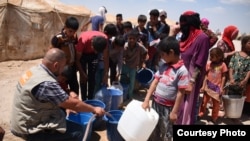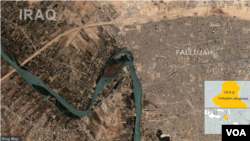One lonely latrine stands on the dusty edge of an open pit – the only facility for 3,000 people recently escaped from Fallujah.
The women use the latrine. The men and children just use the dusty alleys behind the rows of white tents where they live.
The Norwegian Refugee Council, one of a group of aid agencies trying to help the displaced, is struggling. “Safe drinking water, latrines and medical care remain an immediate priority and extremely urgent,” NRC Iraq Country Director Nasr Muflahi said.
An estimated 85,000 people are now living in camps like this one set up outside Fallujah. Some have better conditions. Others do not.
"There is an urgent need of registration of the displaced, coordination and camp management," NRC said in a statement. "New camps [are] opening overnight without any facilities, while others are left without tents and protection."
Inadequate shelter
With the summer heat reaching a searing 45 degrees Celsius, the most vulnerable are collapsing of exhaustion. The United Nations High Commission for Refugees (UNHCR) is building new camps to house almost 19,000 people, and installing generators to provide electricity to 3,000 families. But that is not even a quarter of the people who now find themselves homeless.
"The speed and size of the population displacement from Fallujah has been overwhelming," said UNHCR official Bruno Geddo.
The U.N. last week released $15 million from its emergency response fund to provide urgent life-saving help the displaced. Those still trapped in Fallujah face dire shortages of food, medicine, electricity and safe drinking water. A New York Times reporter in Fallujah described a city of horrors, with decaying decapitated bodies and dog-sized cages for prisoners.
Battle for Fallujah goes on
Although Prime Minister Haider al-Abadi declared victory over Islamic State extremists in the city last week, the fighting is still raging on. Iraqi commanders claim that most of the city is under their control. A loose alliance of Iraqi security forces, federal police, Iranian-backed Shi'ite militias and Sunni fighters have been fighting for a month to retake the city.
According to the U.S. coalition, by Tuesday only a third of Fallujah had been cleared, and IS militants were still holed up in the city’s northwest quadrant.
Fallujah, a Sunni city just west of the capital Baghdad, has been under IS control for more than two years. Many Sunnis at first believed that IS would protect them from sectarian Shi'ite killings and discrimination that plagued Iraq under successive Shi'ite governments. But many also came to suffer under IS' brutal rule, which has been marked by beheadings, hangings, amputations, whippings and drownings.
Once Fallujah has been cleared, Iraqi forces are expected to intensify their advance on Mosul in the north of Iraq. Iraqi Kurdish peshmerga fighters in recent weeks have managed to push the front line to some 20 kilometers outside of the city.






